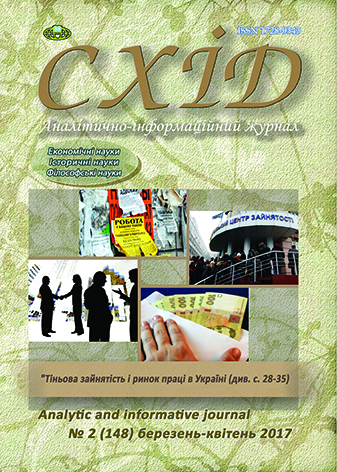Arab world and dialectics of democratization process
DOI:
https://doi.org/10.21847/1728-9343.2017.2(148).118808Keywords:
Arabic society, Arabic world, Islam, democratization, globalization, social conflictsAbstract
The Article is devoted to analysis of difficult sand contradictory process of democratization of Arabic society that takes place already many years. Modern globalization processes touched the Arabic world, where is a collision of civilization paradigms. The aim of the article is discovering of some phenomena being the basis of modern conflicts in the Arabic world.
Basic factors that bother democracy in the Arabic countries are setup in the article. It is marked at the same time, that many social conflicts and elements of social and political in stability, that touched many Arabic countries, partly are the result of western influence and imposing of institutes whish are not peculiar to Arabic sociocultural tradition.
Necessary condition for socially-philosophical analysis in relation to the prospects of democratization of Arabic society are different scientific spheres with in the framework of study of culture, linguistics, religious studies, political science, sociology. If to analyze the level of research of this theme in national social philosophy, then we can see that most researchers of process of democratization accented the attention on influence and value of Islam as religions in Arabic-Muslim society.
The European and American interpretation models of understanding of Arabic civilization of society are situated a spectrum between two poles. From one side it is a know ledged in the west, that Arabic society has cultural features and that it is why need to get used and integrate Arab sin a global community, but with other hand, there is a strong denial of this specific feature. The whole study of history of the Arabic states and Arabic society specifies that one and other conceptions are deeply erroneous and notable to generate the correct model of development of the Arabic world.
Influence of social conflicts on process of democratization is studied not enough in modern social science. Social conflicts, especially the armed, still acquire new and new forms of expression in objective reality and public consciousness. In this connection the study of conflicts in the Middle East must be made with the provision of taking into account all factors of structure of conflicts. Correct understanding of content and forms of religious, economic, political, legal, social, ethnic and cultural constituent of certain conflict give the most complete imagination about its essence and ongoing prospects.Downloads
References
Alekseeva, L.A. and Dodonov, R.A. and Lazarev, F.V. and Muza D.E. (2008), Civilization: from local to global Grad. DonNTU, UNITEH, Donetsk, 236 p. (rus).
Denverworth, A. Rastou and Protsenko, O. [comp., ed.] (2005), Transitions to Democracy: An Attempt to Create a Dynamic Model, In: Democracy: Anthology, Smoloskyp Publishing, Kyiv, 1108 p. (rus).
Buzarov, A.I. (2016), Iran-Saudi conflict: a step away from the war, three steps from the world. Available at: http://rian.com.ua/columnist/20160111/1003301321.html.
Buzarov, A.I. (2016), Syrian web: who and for what is fighting in the Middle East. Available at: https://daily.rbc.ua/rus/show/siriyskaya-pautina-voyuet-blizhnem-vostoke-145311-3983.html
Kotygorenko, V.O. (2002), The Causal Ethnic Conflict: The Impact of Globalization, Politychna Dumka. №1, 97-113 (ukr).
Bibikova, O.P. (2008), Arabs: historical and ethnographic essays, AST: The Guardian, Moscow, 444 p. (rus).
Sergeev, M.S. (2001), History of Morocco. In: The twentieth century. Series: History of the East. The twentieth century, Institute of Oriental Studies, Russian Academy of Sciences, Moscow, 356 p. (rus).
Kirei, N.I. (1996), Ethnography of the Arabs of the Near East and North Africa, The Cuban. state. University, Institute of Economics, Law and Nature. specialties, Krasnodar, 390 p. (rus).
Kryvega, L.D. (2010), The modern Arab world: the problem of leadership. Culturological Bulletin: Scientific and Theoretical Yearbook of the Lower Dnieper. Issue 24. Zaporozhye, 81-84 (rus).
Khalikov, R. Islamic Development Project: Leaks, Global Mobilization, Syria War: Aavailable at: https://uisgda.com/ua/slamskij_proekt_rozvitku_svtu-_vitoki-_globalna_mob-lzacya. _vjna_v_sir._chastina_2_skorochena_versya.html
Khrustalev, M.A. (1973). Social structure of the Saudi society. In: Peoples of Asia and Africa. No. 4. 27-35 (rus).
Voskresensky, A.D. (2007), Political Systems and Models of Democracy in the East, Aspect Press, Moscow, 190 p. (rus).
Lacheraf, Mostefá (1965), Algeria: nation and society, essay, Maspero, Paris, 365 p. (franch).
Bernard, L. (2017), Arabs in world history. From pre-Islamic times to the collapse of the colonial system [translat.], ZAO Centropoligraph, Moscow, 223 p. (rus).
Steiner, R. (1992), Basic features of the social issue in the vital needs of the present and future [translat.], Noah Publishing House, Yerevan, 190 p. (rus).
Bogomolov, A. and Danilov, S. (2011), What is the historical meaning of the Arab revolutions. Mirror of the Week (Kyiv). 25 March. Available at: http://gazeta.zn.ua/POLITICS/v_chem_istoricheskiy_smysl_arabskih_revolyutsiy.html
Downloads
Published
How to Cite
Issue
Section
License
Copyright (c) 2017 Andrey Buzarov

This work is licensed under a Creative Commons Attribution-NonCommercial-NoDerivatives 4.0 International License.
1. Authors bear responsibility for the accuracy of facts, quotations, numbers and names used.
2. Manuscripts are not sent back.
3. The publisher does not always agree with the authors' opinion.
4. The authors reserve the right to authorship of the work and pass the first publication right of this work to the journal under the terms of a Creative Commons Attribution-NonCommercial-NoDerivatives 4.0 International License. This license allows others to distribute (copy) the published work for non-commercial purposes, provided there is mandatory attribution to its authors and a link to the first publication in our journal.
5. The authors have the right to conclude separate supplement agreements that relate to non-exclusive work distribution in the form in which it has been published by the journal (for example, to upload the work to the online storage of the journal or publish it as part of a monograph), provided that the reference to the first publication of the work in this journal is included.

